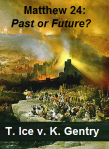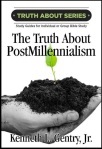VOS ON 2 CORINTHIANS 5 (Part 1)
PMW 2023-051 by Geerhardus Vos
Gentry Introductory Note:
I am currently working on an edited version of some of Geerhardus Vos’ eschatological writings. In this work my friend Bill Boney and I are editing Vos’ technical, Dutch-impacted style of writing, as well as updating some of his early 1900s features (use of Roman numerals, long sentences, very long paragraphs). We are doing this to make his writing more easily accessible in the current environment.
In this and the next two articles, I will be posting Vos’ insightful exegesis of 2 Corinthians 5, which has been so abused by some in the current eschatological debate. Vos is rebutting the view that Paul’s eschatological developed over time, allowing us to trace his changing outlook on the basis of the dates of his epistles. We begin citing Vos where he engages the innovate liberal view of his day that argued that Paul began to believe that believers received a spiritual resurrection body at the moment of their death. So, here we go!
VOS’ PRESENTATION BEGUN
Let us discuss the alleged third stage in the evolution of Paul’s resurrection-belief. This is the stage in which the Apostle is supposed to have moved forward the endowment with a new body to the moment of death in case the death of his earthly body should occur before the parousia. This view is not ascribed to Paul as a firmly established conviction. Rather, it is a more or less contingent eventuality, which nonetheless he seriously reckoned with. The passage on which it is chiefly based is 2 Corinthians 5:1–8, a context extremely difficult of interpretation. This is partly as a result of some uncertainties in the text. These, however, may themselves have arisen from a desire through emendation to remove exegetical or doctrinal obstacles. Paul writes:
“For we know that if the earthly tent we live in is destroyed, we have a building from God, a house not made with hands, eternal in the heavens. Here indeed we groan, and long to put on our heavenly dwelling, so that by putting it on we may not be found naked. For while we are still in this tent, we sigh with anxiety; not that we would be unclothed, but that we would be further clothed, so that what is mortal may be swallowed up by life. He who has prepared us for this very thing is God, who has given us the Spirit as a guarantee. So we are always of good courage; we know that while we are at home in the body we are away from the Lord, for we walk by faith, not by sight. We are of good courage, and we would rather be away from the body and at home with the Lord.” (2 Cor. 5:1–8)
The best method of dealing with the passage seems to be as follows. First, give first a cursory exegesis of the successive clauses, paying particular heed to their syntactical coherence. Then sum up the results obtained in a brief paraphrase. This would be so that the exegesis may be conducted with the greatest degree of discrimination. Thus, it is desirable to place clearly before our minds the traditional understanding of the words.
THE PROSPECTS BEFORE PAUL
This was common up to the time when the modern exegesis took hold of them. This old view interpreted as follows: Paul felt himself in uncertainty as to whether he was destined to survive till the parousia or die previously to that point. If the former happened, the eagerly desired heavenly body would become his immediately. And that would occur without any strange, fearsome process of first stripping off the earthly body now clothing him. In both respects this mode of transformation appeared to him the more desirable. There would be no delay, and there would be nothing of the dread ordinarily associated with death. But in case the other alternative happened through his dying before the coming of the Lord, both of these advantages would be lost. Not only so but there would in addition ensue the far more serious detriment of having to spend the interval between his death and the parousia in a disembodied state, a state of “nakedness” as he calls it.
 Great Tribulation: Past or Future?
Great Tribulation: Past or Future?
(Thomas Ice v. Ken Gentry)
Debate book on the nature and timing of the great tribulation. Both sides thoroughly cover the evidence they deem necessary, then interact with each other.
See more study materials at: www.KennethGentry.com
Confronted with these two possibilities and their differing implications, he gives voice to a strong desire for obtaining the former and escaping the latter. But he never reckoned with a third option, i.e., that the new body could possibly become his immediately upon death. That which on the modern exegesis formed the very pivot of the movement of his hope, did according to the ancient exegesis never enter his mind. He had before him a maximum and a minimum. The former he preferred, but with true Christian resignation expressed himself contented with the latter, should the Lord have that in store for his servant. He could be thus contented with fulfillment of the lesser hope. Because after all it had in common with the higher desire the assurance of being with Christ immediately after death, even if the supreme satisfaction of entering upon that blessedness in the body were denied him.
THE PROPER EXEGESIS
We shall now proceed to our cursory exegesis of the complex of thought. We observe that the opening statement in 2 Corinthians 5:1, when read in the AV, has perhaps more than anything else in the passage given rise and encouragement to the modern interpretation: “For we know that if our earthly house of this tabernacle were dissolved (kataluthe), we have a building from God,” etc. This subjunctive “were” injects into the statement the thought of the improbability of its happening after the manner the sentence describes: “Even if it were — but it is not likely to happen.” This rendering at the outset prejudges the Apostle’s state of mind as to the outcome, and is in no wise required by the Greek text.
The conjunction “if” (ean) with the aorist subjunctive frequently has the force of a future perfect. The correct rendering accordingly would be: “We know that in case our earthly tent-house shall have been dissolved, we have a building from God,” etc. The inaccuracy has been corrected by the RV, which reads: “For we know that if the earthly house of our tabernacle be dissolved” (“be” instead of “were”), etc. Through this correction of the rendering, the impression is made less obtrusive. It is as if Paul in these words reflected upon the availability of a new body for himself in the very moment that the less desirable event of his pre-parousia death should occur. All that the words, strictly taken, mean is that the loss of the earthly body will be made up for (sooner or later) by the supervening of a wholly-differently complexioned body pertaining to another sphere. But of the point of time when this certainty shall enter into actuality, nothing is said. Nor do the words, taken by themselves, contain an intimation as to whether the “dissolution” is near or not.
Paul’s “we have” statement. But, it will be asked, does not the present tense “we have” (echomen, 2 Cor. 5:1), when joined to the foregoing, imply that the new body must be in possession of the Apostle, when he dies? Otherwise how could he declare that at the extreme moment of his earthly life he has it? There is more than one way to meet this difficulty.
The Truth about Postmillennialism By Ken Gentry
By Ken Gentry
A group Bible study guide for explaining the optimistic prophetic hope for this world to be accomplished before Christ’s Second Coming. Establishes the postmillennial system in both the Old and New Testaments. Touches on key eschatological issues, such as creation, covenant, interpretive methodolgy, the great tribulation, the Book of Revelation, the Jewish Temple, and more. It presents and answers the leading objections to postmillennialism.Twelve chapters are ideal for one quarter of Sunday School.
See more study materials at: www.KennethGentry.com
The verb “we have” can be given the sense of assured possession, carrying a title by right to something that may or may not as yet be in existence. Or “we have” might be a case of imaginative projection into the world to come. The closing words of 2 Corinthians 5:1 (en tois ouranois, “in the heavens”) favor the latter, for they do not, of course, describe where the body now is or has been from the first. That would be a formal avowal of the pre-existence of souls. This could hardly in the Apostle’s view have been confined to souls, when once embraced with regard to them.
What the phrase really means is that heaven is the place in which the body, when received, will be permanently possessed, in which it will exist and move and live. That such is the correct interpretation can be verified from the corresponding phrase “earthly” (epigeios), applied by way of contrast to “tent-house” (oikia tou skenous). Actually the term “house” (oikia), which is the object of “we have,” is used from the standpoint of the actual and permanent possession in the heavenly life. This appears from the difference between it and the term “building” (oikodome) used just before. In the latter the emphasis rests on the origin of the body: it is a building, something constructed. Hence the added words ek theou: it is a building provided “by God,” of his own making. In the former the emphasis rests on the existence of the body as a finished product, a “house.” Second Corinthians 5:1, therefore, leaves it undecided when this body will be received, and in no way implies its pre-existence. The characterization of the new body as “eternal” only intends to set it off against the frail and collapsible “tent-house,” serving as a figure for the earthly body.
THE TWO AGES AND OLIVET (advertisement)
I am currently researching a study of the Two-Age structure of redemptive history. My starting point is based on the disciples’ questions to Jesus in Matthew 24:3. Much confusion reigns among those unacquainted with the Two-Age analysis of history, which was promoted by Jesus (Matt. 12:32; Mark 10:29-30) and by Paul (Gal. 1:4; Eph. 1:21). The Two Ages are not the old covenant and the new covenant, but world history since the fall and the consummate order following the Second Coming and the Final Judgment.
If you would like to support me in my research, I invite you to consider giving a tax-deductible contribution to my research and writing ministry: GoodBirth Ministries. Your help is much appreciated!
Kenneth L. Gentry Jr.'s Blog
- Kenneth L. Gentry Jr.'s profile
- 85 followers



